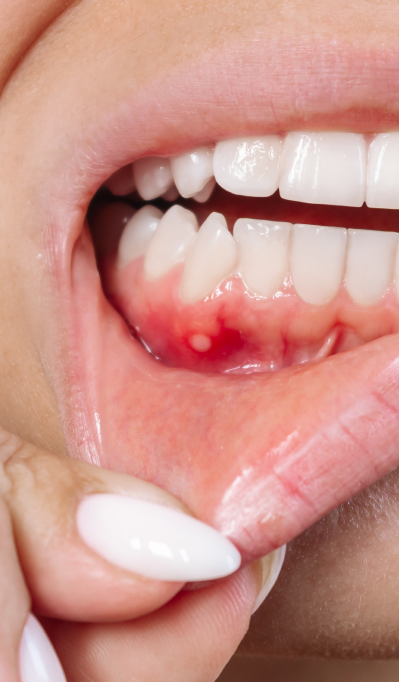Oral Pathology in Memphis TN
OR CALL (901) 300-4162
The inside of the mouth (from the lips to the gum tissue) is normally lined with a special type of skin (mucosa) that is smooth and coral pink in color. The teeth and palate are lined with gum tissue (gingivae). Any alteration in the normal appearance of these tissues could be a warning sign for a pathological process. The most serious of these is oral cancer.
What Are The Possible Signs of a Pathologic Process or Cancerous Growth?
- Reddish patches (erythroplakia) or whitish patches (leukoplakia) in the mouth.
- A mouth sore that fails to heal and/ or bleeds easily.
- A lump or thickening on the skin lining the inside of the mouth.
- Chronic sore throat or hoarseness.
- Difficulty in chewing or swallowing.
- An elevation of bump in the mouth.
These changes can be detected on the lips, cheeks, palate, and gum tissue around the teeth, tongue, face, and/or neck. Pain does not always occur with pathology and, curiously, is not often associated with oral cancer. However, any patient with facial and/or oral pain without an obvious cause or reason may also be at risk for oral cancer. Some of the major causes of oral cancer include tobacco usage especially smokeless tobacco, alcohol, periodontal disease, etc. We would recommend performing an oral cancer self-examination monthly and at least yearly at your dentist’s office. Remember your mouth is one of your body’s most important warning systems. Do not ignore suspicious lumps or sores. Please contact us so we may help.
Mouth Sores: If sores appear in your mouth, a mouth rinse to aid in healing and comfort can be prescribed. This is called Magic Mouth Rinse. If the sores are viral in nature, an antiviral medication may be indicated. If sores continue to be a problem, you need to be examined and possibly have a biopsy to determine what is wrong.
Types of Cancerous Pathology in the Mouth Include:
Squamous Cell Carcinoma, Epidermoid Carcinoma, Melanoma, and Metastatic Cancer (cancer spreading from other areas of the body like breast cancer).

Types of Non-Cancerous (Benign) Pathology in the Mouth Include:
Periodontal Disease, Fibromas (Scars), Pyogenic Granuloma (Pregnancy Tumor), Peripheral Ossifying Fibroma, Desquamative Gingivitis (including Lichen Planus, Pemphigous, and Pemphigoid), Acute Necrotizing Ulcerative Gingivitis (ANUG), Lichen Planus, Burning Mouth Syndrome, Herpes Labilis (Fever Blister)(Cold Sore), Pyogenic Granuloma (Pregnancy Tumor), Migratory Glossitis (Geographic Tongue), Tori, Torus, Exostosis and many more.
What is a Biopsy & Why is it Necessary?
A biopsy is the removal of tissue for pathological (disease) analysis. After removing a suspicious lesion, we will send the tissue to the University of Tennessee Department of Oral Pathology for analysis. Determining the type of unwanted tissue gives peace of mind and helps in treatment decisions. Commonly a biopsy can be accomplished with the VersaWave laser to decrease pain, control bleeding, and speed healing.
What Alternatives Are There To A Biopsy?
An alternative to a biopsy and to help in cancer detection, we can use the identafi 3000 ultra cancer detection device.


